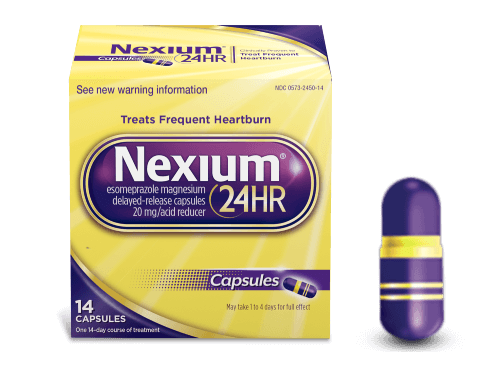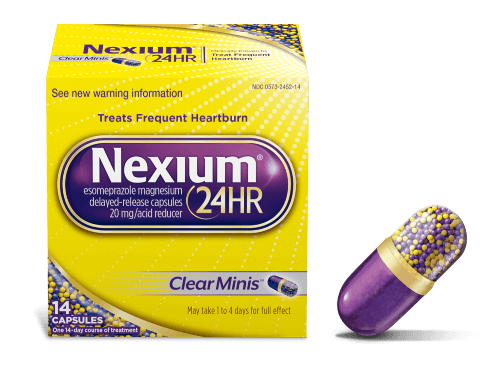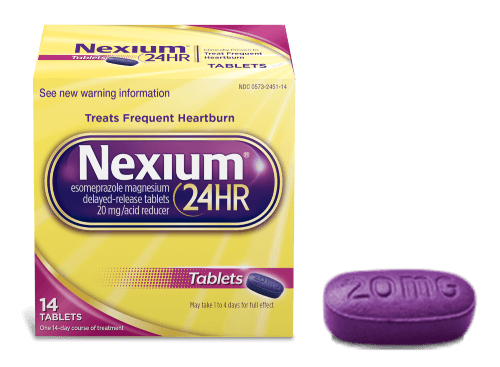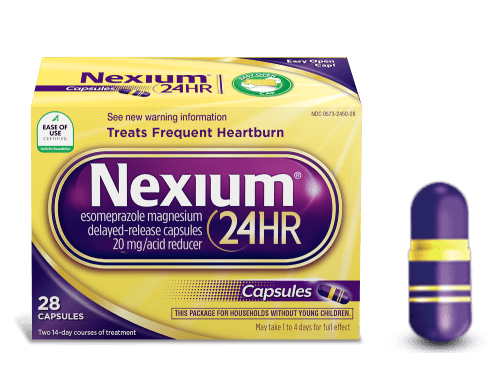If you frequently suffer from symptoms of acid reflux or heartburn, you’re not alone: about 20% of Americans experiences some form of chronic acid reflux.1
Like many others who share your symptoms, you might find relief by changing up your daily food routine, which can lessen the feelings of heartburn that you may be experiencing. See what common, easily available foods might improve your acid reflux symptoms as part of a cohesive diet—especially when partnered with a proton pump inhibitor like Nexium 24HR that can alleviate uncomfortable symptoms from frequent heartburn and acid reflux.
Types of food to avoid if you’re suffering from acid reflux
Diet can have a big impact on acid reflux, and heartburn is caused primarily by foods that are high in fat or spice.1 These foods can include anything that’s fried, fast food, pizza, processed snacks and fatty meats like bacon or sausage.1
While these foods might seem obvious in terms of being less than healthy, other foods that might seem more innocuous can also cause heartburn. Tomato-based sauces, citrus fruits, chocolate, and peppermint might also lead to symptoms of heartburn.1
Diet suggestions for heartburn relief
A diet rich in fiber and low in fat, can be effective in preventing symptoms of acid reflux.3 In addition, foods that contain a lot of water can dilute and weaken stomach acid:1
- High-fiber foods: whole grains, root and green vegetables
- Alkaline foods high in pH (not acidic): bananas, cauliflower, nuts, and melons
- Watery foods: celery, watermelon, teas
Vegetarianism and Veganism
This common diet excludes meat, and depending on ethical and religious practices, may also exclude all animal products such as dairy, honey, or eggs.2 Eating vegetarian might reduce one’s risk of common health problems, but it also means a greater risk of iron-deficient anemia or inadequate protein, vitamins and mineral intake found in meat.2
Paleo
This diet encompasses lean meats, vegetables, nuts, and seeds, and excludes legumes (such as beans) and grains.2 Since it focuses on fresh and relatively unprocessed food, it may be linked to weight loss and lower blood pressure; however, it excludes good sources of fiber and vitamins found in legumes and grains.2
Keto Diet
This low-carb, high-fat diet induces ketosis, a metabolic state in which your body burns fat for daily energy instead of carbohydrates.2 It has been used as an aid for weight loss,2 which can be an option to avoid the link between body weight, dietary habits, and GERD.3 Its focus on a strict diet of healthy fats and no grains at all can help in weight loss, but should be followed under a doctor’s or dietician’s advice to avoid further health risks.2
Mediterranean
This diet is based around fish, poultry, healthy fats, beans, and eggs, with moderate amounts of dairy and less red meat.2 It has been linked to less risks of heart issues, but may also include possible deficiencies in iron and calcium usually found in meat and dairy.2
Diet plays a major role in controlling acid reflux symptoms.1 Before beginning a new diet routine, consult your healthcare professional to see what may be causing your heartburn, what foods to look forward to, and over-the-counter medications such as Nexium 24HR that can reduce your acid reflux symptoms, like frequent heartburn.
Source Citations:
- GERD Diet: Foods That Help with Acid Reflux (Heartburn). Johns Hopkins Medicine. https://www.hopkinsmedicine.org/health/wellness-and-prevention/gerd-diet-foods-that-help-with-acid-reflux-heartburn/. Accessed 5/17/2024.
- Pros and Cons of Different Diet Lifestyles. Integris Health. https://integrishealth.org/resources/on-your-health/2021/january/pros-and-cons-of-different-diet-lifestyles/. Accessed 5/17/2024.
- Body weight, lifestyle, dietary habits and gastroesophageal reflux disease. National Library of Medicine. https://www.ncbi.nlm.nih.gov/pmc/articles/PMC2668774/. Accessed 5/17/2024.





